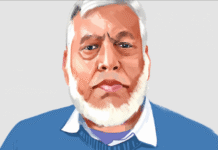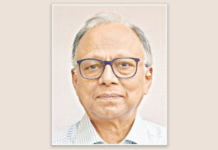BNP has extended an olive branch. It deserves a hearing
On November 18, BNP chairperson Begum Khlaeda Zia revealed a detailed proposal for strengthening the Election Commission on behalf of her party. While the ruling Awami League almost immediately brushed the proposal aside, many experts believe that this revelation has created scope for meaningful dialogue between the major parties.
The BNP quite evidently seems to have opted for a more pragmatic approach by coming through with this proposal in the context of current reality.
The proposal outlines a set of suggestions/prescriptions that, the BNP believes, has to be implemented to ensure the neutrality of the commission and eventual capacity-building. While the proposal is made up of several systemic adjustments that hint towards institutional reform, the key guiding principle that is evident across the content is “consensus.”
In fact, the proposal begins by implicitly declaring consensus of all political parties as a starting point and a compulsory pre-condition before resorting to any measures. In a political environment rife with animosity and mistrust, a consensus on a single issue could prevent us from at least reaching the nadir.
The proposal also immediately delves into the role that can be played by the president of Bangladesh to ensure the much-needed consensus by meeting representatives of all political parties.
There is enough room and time to at least start a feasible dialogue to move towards resolution. The BNP has already extended an olive branch in the form of this proposal. They at least deserve a hearing
This shows that the BNP has kept unbounded faith in the constitutional head of state in terms of fair disposal of his duties. Furthermore, it also reflects the BNP’s willingness to work with the establishment to break the political deadlock by means of a substantial institutional reform that will serve as a long-term solution to election-related woes.
One must also keep in mind that the proposal floated by the BNP strictly focuses on the Election Commission reforms and does not suggest any constitutional amendments. The proposal seems to clearly rest on the fulcrum of belief that if a consensus can be achieved then the execution aspect can take place in good faith.
While political consensus is at the heart of the proposal, the key content of the proposal can be divided into three broad sections: The first broad section deals with the recommendations regarding the formation of a neutral “search committee” which will partake in the selection of the election commissioners. It clearly states that the president of the republic “will constitute the search committee on the basis of consensus among all registered political parties of Bangladesh and/or among all political parties who, over different periods, had representation in the National Parliament since the liberation of Bangladesh.”
The proposal then recommends a search committee constituting of five members including a convener. The proposal emphasises on the need for impartiality, experience, respectability, strong will, and high moral standards of these individuals. There should be no ambiguity regarding the essentiality of these traits and hence the proposal continuously harps on the notion of integrity.
The second broad section outlines a set of qualifications for the Chief Election Commissioner and the election commissioners and their subsequent appointment procedure. It should be mentioned that previously there has been no specific set of guidelines in terms of qualification to select Election Commissioners.
It is rather refreshing to see that this proposal contains specific yardsticks which can be utilised by the search committee to make an informed and unbiased decision. Apart from various procedural recommendations, one of the key suggestions is that “an employee of the Republic or statutory government authority or defense personnel, who has not completed three years after retirement, or resignation, or dismissal, or has not completed a span of three years after completion contractual appointment, or cancellation thereof, shall not be entitled to be election commissioner.”
This specific suggestion in essence holds the key to minimising the influence of the executive on the Election Commission to force an outcome. Yet again, in the context of current political scenario, this particular recommendation holds a lot of water. The third broad section of the proposal deals with the empowerment and strengthening of the Election Commission. While it would be rather difficult to dwell on all the recommendations within a short space, certain recommendations require special attention.
One of the key recommendations in this particular case is that the Bangladesh Election must have its own secretariat. It states clearly that “according to Article 79 of the Constitution, Bangladesh National Parliament has its own secretariat. Likewise, the Bangladesh Election Commission must have its own secretariat as well. Bangladesh Election must have financial power.”
Aimed at empowering the Election Commission, this particular prescription has a long-term implication in terms of delivery of service, capacity building, efficiency and accountability. Furthermore, a secretariat will enable the Election Commission to develop its own resources and gain financial strength. One of the recommendations that has already drawn a lot attention is the deployment of the defense forces during election time.
However, the more specific suggestion in this regard is that “during National Election, the Election Commission will arrange to deploy Defense Forces with magisterial power, especially, at the polling centers and other strategic places. This deployment will come into force seven days ahead of Election Day till gazette notification of the election results.”
Given the nature of elections observed during the recent Dhaka and Chittagong mayoral race, this recommendation has become a necessity to ensure order and fairness. If the member of the forces is not empowered with magisterial power, they will not be able to resolve problems immediately in order to bring order.
Furthermore, magisterial power will also ensure that they will not come under any undue influence during disposal of duties. Given that our defense forces have always stepped forward with integrity whenever calamities arose, ranging from natural disasters to traffic control, it is only rational to think that they should and would play a pivotal role in securing, for the general citizens, the right to vote freely.
As we gradually approach towards an election year in 2019, it is rather heartening to see the BNP come up with a proposal well ahead of time. While the proposal contains a lot of technical details, the crux remains to be the notion of consensus and integrity.
There is enough room and time to at least start a feasible dialogue to move towards resolution. The BNP has already extended an olive branch in the form of this proposal. They at least deserve a hearing. The modalities can be discussed but a partisan approach of being absolutely dismissive will not bear any fruit. The forum is open now and the whole nation is watching.
Israfil Khosru is a businessman and a concerned citizen.
Source: Dhaka Tribune










